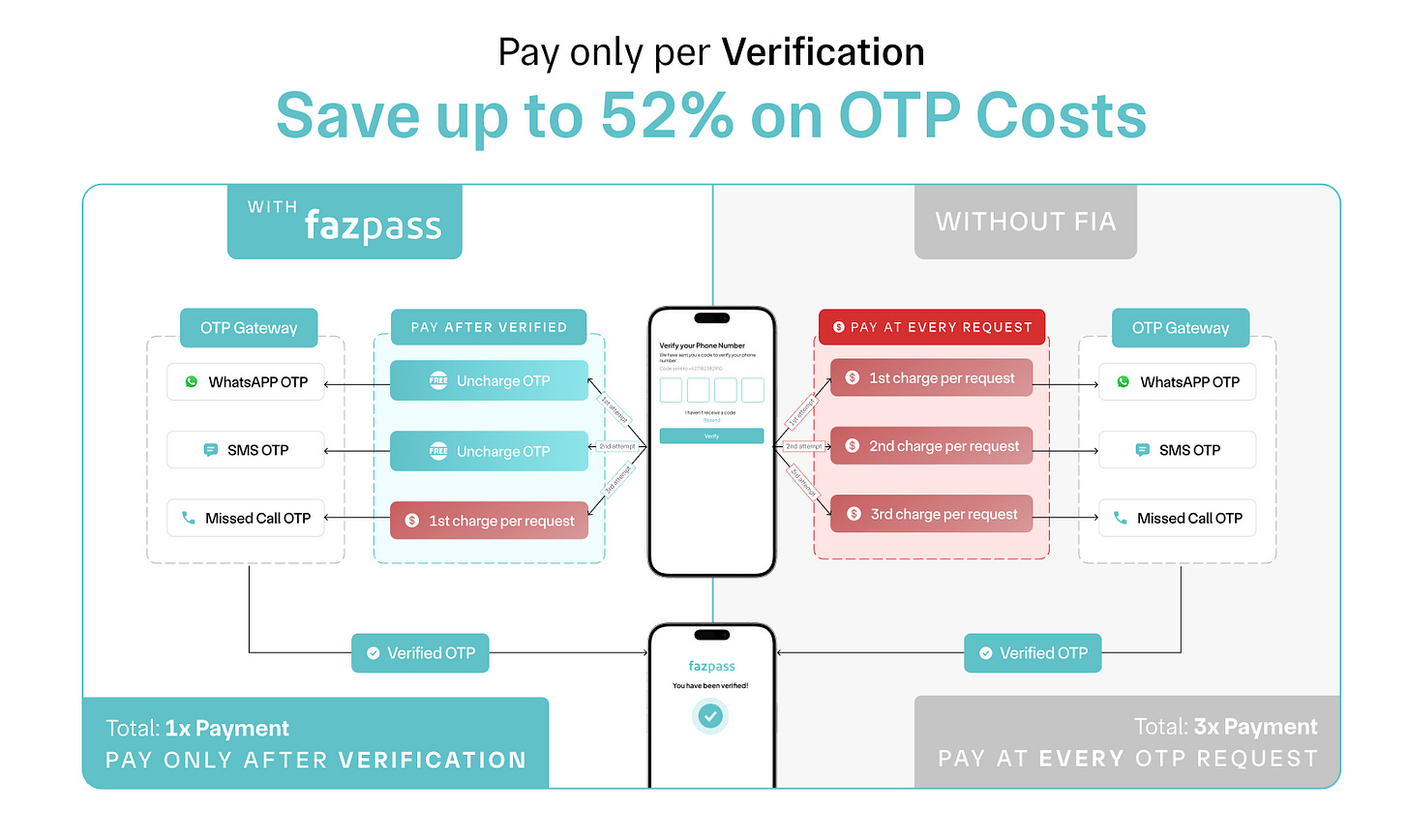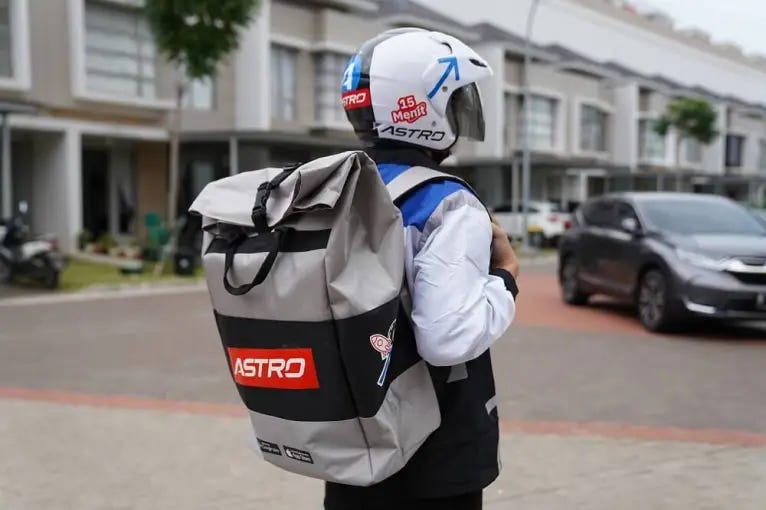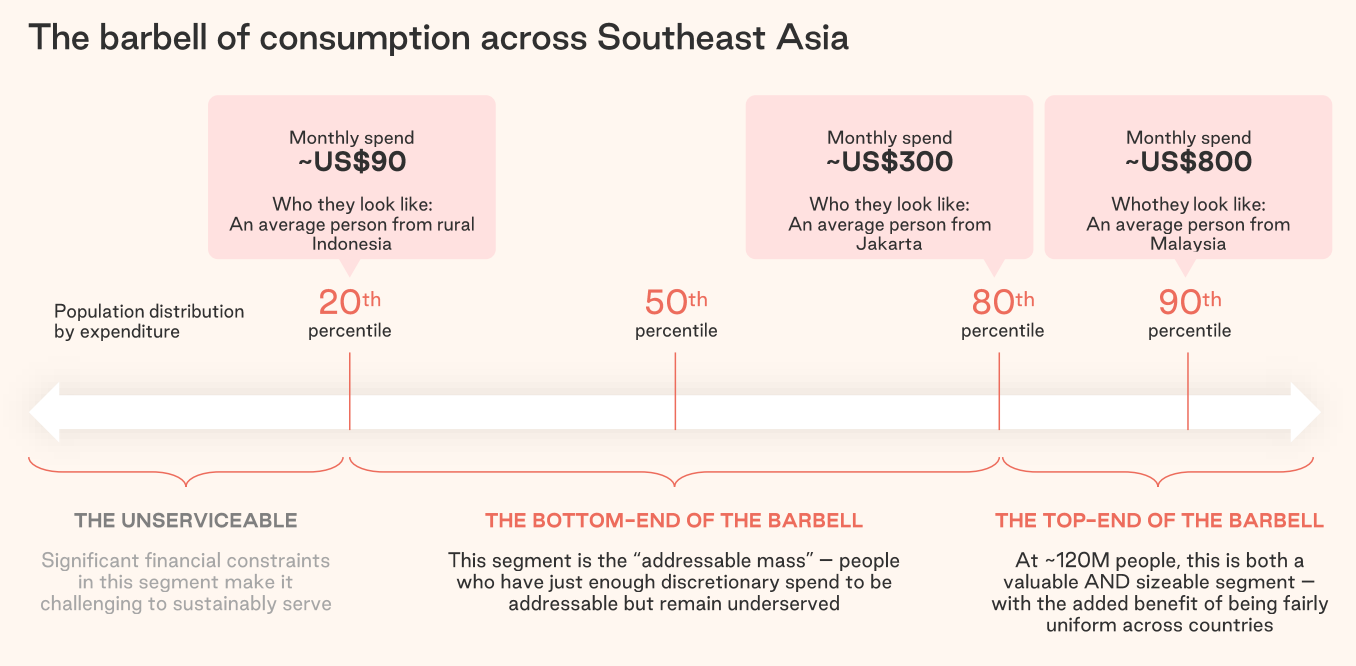PasarPolis funding 💸, Amazon fuels Astro 🚀, SEA’s consumer barbell🎯
Dear subscribers,
We’re back with a fresh look at Indonesia and Southeast Asia’s tech and digital ecosystem. From funding moves in insurtech and quick commerce, to bold plays in mobility and infrastructure, the region continues to show resilience and ambition. We also spotlight Indonesia’s push in digital manufacturing and the evolving dynamics of consumer behavior, where opportunities are shifting toward the two ends of the market. As always, our aim is to bring you the signals that matter most for founders, investors, and policymakers navigating this fast-changing landscape.
This week’s newsletter is sponsored by Fazpass. Most OTP providers charge per request, making resends and failures costly. Fazpass Intelligence Authentication lets you pay only after a successful verification—cutting costs by up to 52% while ensuring reliable verification through auto-switching across WhatsApp, SMS, or missed calls. [Try Now!]Best regards,
The DailySocial Team
🚨 What’s New
PasarPolis secures fresh funding 💸
PasarPolis, Indonesia’s leading insurtech, has raised new funding in an extension round led by Japanese insurance giant Tokio Marine. While the exact figure was not disclosed, sources close to the deal said it was around USD 5 million. The fresh capital will help PasarPolis deepen its presence in Southeast Asia and expand its digital insurance products.Amazon backs Astro’s quick commerce push 🚀
U.S. tech giant Amazon has reportedly invested USD 51.9 million in Indonesian quick commerce startup Astro. The move comes just as Amazon officially launched its own 10-minute delivery service in India, signaling stronger ambitions in the region. For Astro, the investment strengthens its financial position in an increasingly competitive market where consolidation is expected.
GoTo secures $286M loan facility 💰
GoTo Group has obtained a Rp4.65 trillion (USD 286 million) syndicated loan from DBS Indonesia and UOB. The facility, with a four-year tenor, will be used to refinance existing debt and support general corporate needs, including investment and working capital. As of June 2025, GoTo still had Rp467 billion outstanding from its 2022 loan, which this new funding helps cover. The company emphasized that the loan poses no adverse impact on its operations or financial health, but instead strengthens its liquidity.Green SM scales EV taxi service nationwide ⚡🚖
Green SM, the Indonesian EV taxi operator, is accelerating its expansion with three new launches in a single week. The company debuted its service at Soekarno-Hatta International Airport, marking a major step in electrifying airport transport. Soon after, it entered Jakarta’s eastern suburb, Bekasi, broadening coverage in Greater Jakarta’s commuter belt. It also made a strategic move into Makassar, opening access to eastern Indonesia’s economic hub. This rapid rollout reflects Green SM’s ambition to dominate the EV mobility market across the archipelago.
✨ What’s Exciting
INA bets big on AI, health, and renewables 🌱🤖
Indonesia’s sovereign wealth fund Indonesia Investment Authority (INA) is sharpening its focus on strategic sectors: digital infrastructure, AI in healthcare, and renewable energy. The fund, now managing USD 10 billion, aims to attract foreign partners and technical expertise to strengthen these industries. INA is diversifying beyond equity into hybrid capital and private credit to support Indonesian companies’ global expansion. This direction aligns with the government’s priorities on data independence, energy transition, and healthcare modernization—areas seen as critical for long-term economic resilience.
Indonesia showcases digital manufacturing at Hannover Messe ⚙️🇮🇩
Indonesia showcased its advancements in digital manufacturing at the Hannover Messe 4.0 Expo, highlighting the country’s push toward Industry 4.0 transformation. The showcase highlighted Indonesian smart factory, automation, and digital solutions aimed at boosting productivity and competitiveness. Officials stressed that manufacturing innovation is key to economic growth and positioning Indonesia in the global supply chain, while reaffirming the nation’s commitment to international collaboration in industrial digitalization.
🔮 What’s Next
Latest report by Lightspeed Venture Partners stated that Southeast Asia’s consumer landscape is increasingly shaped by a barbell economy, where the most attractive opportunities lie at the two ends of the spectrum: affluent consumers with spending power comparable to developed markets, and the mass market seeking affordable, high-value solutions. Meanwhile, the middle segment, which often appears large in surveys, converts poorly at checkout, making it less compelling for investors and operators
At the top end, about 14% of Southeast Asians earn more than US$1,000 per month—a share expected to reach nearly 20% by 2030. This group displays spending patterns similar to global consumers, channeling their income into premium products, healthcare, education, and quality experiences. Income growth has been heavily skewed, with the top 10% expanding almost three times faster than the bottom 90% over the past decade, further concentrating purchasing power at the top.
On the other side, the mass market remains a vast but challenging opportunity. Consumers in this segment demand low prices, small packaging, and wide access, often gravitating toward “cheap dopamine” such as low-cost entertainment and small indulgences. Products considered mainstream in markets like China often reach only a fraction of Southeast Asia’s population, requiring highly innovative models in distribution, pricing, and monetization. This is the essence of the barbell strategy: build for the affluent with high ticket sizes, or serve the mass market with extreme efficiency—while the middle continues to be squeezed and hard to monetize.



